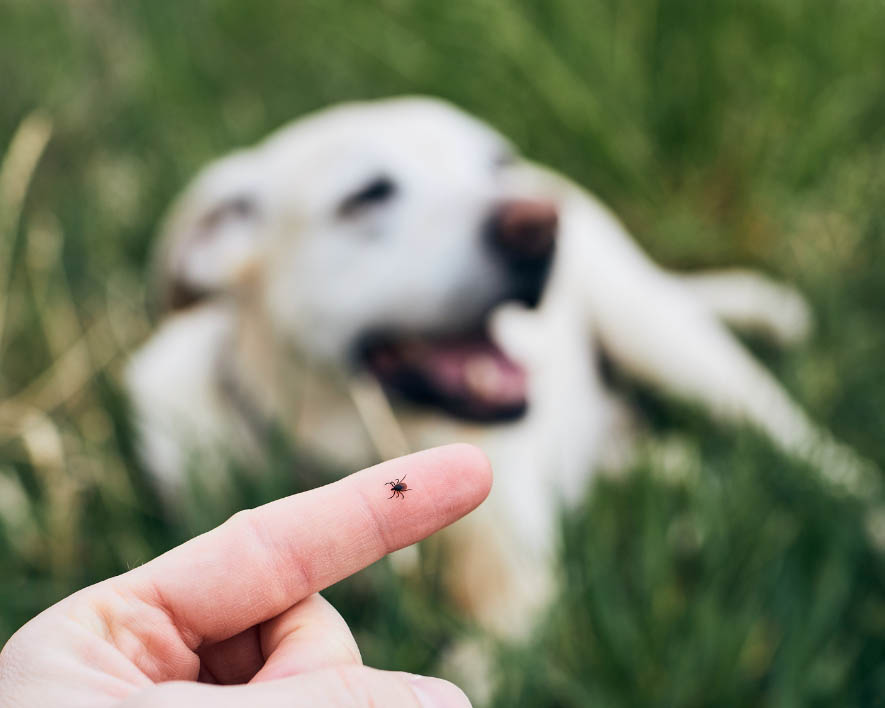Labradors are wonderful dogs with many positive traits. They’re playful, adventurous, gentle, and adore their people. However, one negative trait is that labs are prone to skin irritations and issues.
My chocolate lab Lucy has been prone to hot spots her whole life. That’s just one kind of painful, itchy irritation that can even end up infected.
However, there are many irritants that can cause temporary or chronic itching for your dog. The itching can lead to open sores, infections, and a generally miserable pup.
In this blog post, I will explain some of the common causes of itchy skin for labs, what symptoms to look for, and treatments that can help get your lab back to their fun-loving self. If you have a labrador with itchy skin, save and share this post!

This post contains affiliate links. When you buy anything using my links, I might earn a small commission. That helps me keep the lights on and the dogs fed here at Wear Wag Repeat.
Common Causes of Itchy Skin in Labradors
Why are labradors prone to allergies? There’s a genetic predisposition for labs to have skin and food allergies. They’re overall very robust and healthy dogs. But if your lab has an allergy or sensitivity, you’re not alone!
First, you need to figure out what is the cause behind your labrador with itchy skin. Is it a chronic, ongoing problem? Or are they just feeling itchy for a few hours?
Environmental Factors That Affect Labrador Skin
Environmental elements can affect your dog’s skin, especially if it’s something that is prevalent in your home or anywhere your dog spends a lot of time.
Environmental factors that cause itching can include:
- Pollen
- Mold
- Dust
- Fungi
If your dog is suddenly itchy, ask yourself if their living environment has changed. Did you move recently? Did your dog spend the weekend at grandma’s house?
It could be as simple as a change of season. In the spring, your dog may be affected by pollen in the air. In the fall, they might be impacted by the mold and fungi that grow on wet leaves.
Our dogs often walk through and sniff leaves, grass, trees, shrubs, dirt, etc. that can be covered in environmental contaminants.
When this stuff gets in their fur, on their paws or in their eyes and ears it can lead to inflammation, irritation and itching.

Pesky Bug Bites and Their Effect on Your Labrador
Just like us, our furry friends can get stung by annoying bugs and insects. For outdoor adventure-loving Labradors, they might come in contact with bug bites or stings more often than other dog breeds who don’t need to leap into nature at every chance.
One of the most common irritating insects is ticks. But ticks aren’t just annoying, they can also transmit disease.
If a tick is crawling on your lab or bites them and is embedded in their skin, that can turn into an area that your dog wants to itch and scratch. When you get back from any woodsy adventures or walks in tall grass, always check your dog for ticks. I recommend having this Tick removal took in your car or at home, it really comes in handy.
Despite your dog’s thick fur, mosquitoes can also get in and bite your lab’s skin. And just like a mosquito bite for us, it’s going to be itchy. While the itchy effects will be temporary, mosquitos also carry the risk of spreading heartworm to your dog.
Make sure your dog is on a heartworm preventative like HeartGuard. It’s much easier to prevent heartworm than it is to treat it.
A third common bug that can irritate your dog is fleas. These are probably the most infamous because they don’t just cause itching, but they can lead to a whole home infestation. Yuck!
Excessive scratching of any of these insect bites can lead to hot spots. Hot spots happen when the skin is raw and inflamed and they can spread very quickly into big painful oozy rashes.
My dog Lucy is prone to hot spots on her neck and head. I wrote an in-depth blog post about how to treat hot spots. I hope that helps if this is a problem your lab has!

Food Allergies vs. Intolerances: What’s Bothering Your Lab?
If you have a labrador, then you know how much they love to EAT! But what if the food they eat every day is causing inflammation or an allergic reaction?
The term “food allergy” is used a lot to describe a dog who doesn’t actually have a true allergy, but instead has an intolerance for chicken, grain, lamb, eggs, etc.
A true food allergy is something that would trigger a dramatic reaction. We’re talking a full-blown immune system response where their body attacks the harmful ingredient. This can result in red, inflamed, itchy skin all over, shortness of breath, nausea and more. An allergic reaction requires medical attention.
On the other hand, a food intolerance is very common. It’s most likely that when your dog has itchy skin or ears, runny eyes, stinky farts, or loose stool it’s being caused by an intolerance (not an allergy).
While both can cause discomfort, it’s important to point out that a severe allergic reaction can be life-threatening. An intolerance can cause discomfort but is not an emergency.
If you’d like to get to the root of your dog’s food intolerances and put a stop to the itching, read my review of the 5Strands Food and Environmental Intolerance test. You send in a hair sample for your dog, they analyze it, and then tell you what foods and environmental factors your pup has a sensitivity or intolerance to. It’s been great for my lab Lucy!

Key Symptoms of Labrador Allergies and Skin Reactions
So you think your dog is having a reaction to something? Here are some of the symptoms beyond itching and scratching to keep an eye out for and when you should call the vet.
Signs of Atopic Dermatitis (basically, eczema) in Labradors
- Excessive itching, especially of their ears, mouth, and eyes
- Excessive licking, especially of their paws
- Hot, red, and inflamed skin
- Recurring ear infections
- Chewing on areas like armpits, groin, and paws
- Hair loss
Signs of Food Allergy or Intolerance in Your Lab
- Itchy skin, hives, and facial swelling
- Vomiting, diarrhea, gurgling tummy noises
- Chronic awful farts
- Poor skin and coat quality,
- Chronic ear and paw infections
- Lethargy
- Behavioral issues like aggression or hyperactivity
Personally, I would keep an eye on any of these symptoms for the first 24 hours. Practice basic first aid if you feel comfortable.
For any eye irritations, I flush the area with a sterile saline solution. For ears, clean with an ear-cleaning solution like EpiOtic. If the skin is broken, please contact your vet for advice to avoid infection.
If your dog is itching a lot (like with a hot spot), it’s a good idea to have a cone or inflatable collar on hand. Sometimes the irritation can heal on it’s own as long as your dog will stop licking or scratching at it.
If any of these symptoms persist for more than 24 – 48 hours, I would use your best judgment to contact your vet. If these are chronic symptoms that keep coming back or have been going on for a long time, please ask your veterinarian for advice.
When Veterinary Attention is Essential
It’s crucial to consult your vet if you think your lab is suffering from itchy skin because it can be a symptom of so many other things.
Early detection and intervention can prevent secondary skin infections, especially in the ears. Your vet can assess the problem, conduct necessary tests, and guide you on the best course of action.
If you suspect that your dog has a true food allergy (instead of an intolerance) it’s essential to contact your vet right away because a severe allergic reaction can be life-threatening.

Effective Treatments for Labradors with Itchy Skin
If you think that your lab is experiencing chronic itchiness due to food intolerance, there are some proactive steps you can take to help them.
First, I highly recommend the 5Strands Food and Environmental Intolerance Test. I did this with my lab Lucy and learned so much! Read my review of the 5Strands Test for Dogs and get 10% off with code torimistick.
Once you take the test and get your results, you will have the info you need to move forward.
You’ll be able to do a food-elimination diet trial for three months to identify potential allergens. During this period, feed your lab a diet consisting of protein and carbohydrate sources they have not been exposed to before and that come up as “green” on their lab results. Carefully monitor their reaction and gradually reintroduce other foods one at a time while tracking any changes.
When you take the 5Strands Test you have the option to consult with one of their pet nutritionists. I did that and it was so valuable!
If you opt for theFood and Environmental test, you will also be able to see any environmental elements that could be irritating your lab and causing them to scratch all the time.
Proactive Steps to Prevent Your Lab’s Itches
Nutrition plays a pivotal role in your dog’s overall health and in preventing food allergy dermatitis. Always provide your lab with top-quality pet food brands or consider making homemade dog food or treats to supplement their meals.
One of the best supplements you can give to help with your lab’s itchy skin is Omega-3-rich fish oil. When given consistently, Omega-3 fatty acids can help with skin issues and promote a healthier coat. Essential fatty acids in fish oil also benefit your dog’s heart, joints, and more, making it a great supplement to add to your lab’s diet.\
Simple Fix: Is your dog getting enough water?
Dehydration can affect digestion and lead to dry, itchy skin. Adding half a cup of warm water to your dog’s food can aid digestion and potentially relieve some symptoms of dry, itchy skin. Johnna Devereaux, a clinical pet nutritionist, recommends this simple fix.

The 5Strands Test: An Essential Tool for Labs with Skin Allergies
Understanding and addressing your Labrador’s skin allergies is crucial for their well-being. The 5Strands test that I’ve mentioned a few times is a valuable tool for identifying the root of the problem. Once you know the root cause of your dog’s itchiness, you can take the next step to help them. It might be as simple as switching to Chicken based food to Beef or changing their bedding from a wool blanket to a cotton one.
If you want answers and to give your dog some relief from chronic itching or other symptoms, the 5Strands Food and Environmental Intolerance Test for Pets can do that for you! It analyzes a hair sample from your dog and identifies food and environmental factors that your pup may have a sensitivity or intolerance to.
This test has been a game-changer for my 11-year-old labrador Lucy! I believe that it will help you improve your dog’s health as well.
More Resources for Dogs with Skin Allergies
Read my blog post about treating hot spots for more helpful information.
Being proactive about your Labrador’s skin health is essential. If you notice frequent licking or scratching, don’t ignore it! Regular vet check-ups, a balanced diet, proper hydration, and the 5Strands test can provide valuable insights and help manage and prevent skin allergies in your lab.
Remember, a happy, healthy lab is a happy you!
Did you enjoy this post? Here’s more posts all about Labradors:
10 Things I love about Senior Labradors
How Cold is too Cold to Walk a Labrador?
How to Safely Switch your Labrador to a New Food
85+ Unique and Classic Names for Chocolate Labs





0 Comments